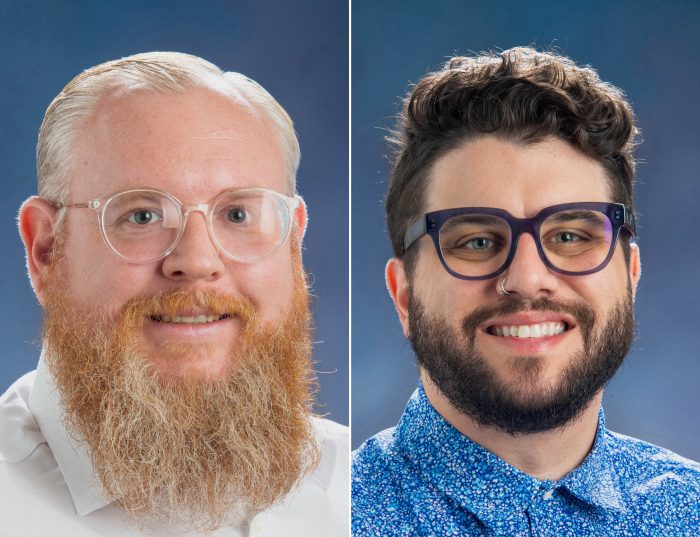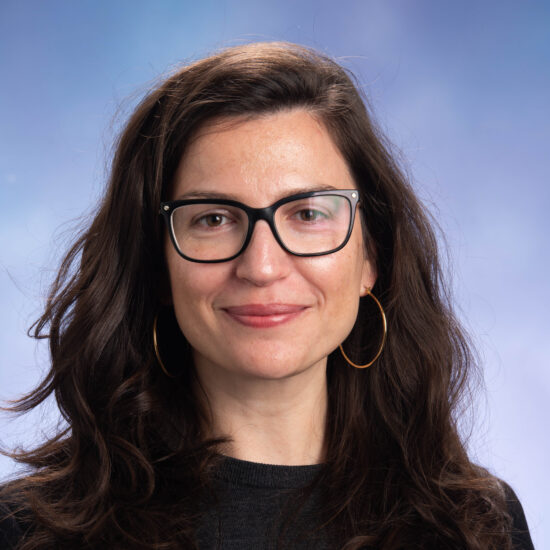TAMUC Faculty Win Grant Award for Digital Privacy Lab on Campus

A collective featuring two Texas A&M University-Commerce faculty members is the recipient of a monetary award that will be used to establish a digital rhetorical privacy lab on the university campus.
Dr. Charles Woods and Dr. Gavin Johnson, both assistant professors in the Department of Literature and Languages at A&M-Commerce, are advisory board members of the Digital Rhetorical Privacy Collective (DRPC), a project Woods founded in 2022. The collective, which currently includes representatives from five universities across the U.S., describes itself as a coalitional action undertaken to continue to better understand the importance of digital privacy for ending oppression in American society and building an equitable future for all.
In February, the DRPC was honored with the Emergent Researcher Award by the National Council of Teachers of English at their Conference on College Composition and Communication. The monetary award of just under $2,000, while small, is seen as a seed to begin funding a lab space on the A&M-Commerce campus dedicated to digital rhetorical privacy research.
What is Digital Rhetorical Privacy?
“This is a concept that comes from my dissertation project,” Woods said. “It is a state of being when a user is confident their digital data is free from unauthorized observances by nefarious computer technologies and other users.”
“The rhetorical part of it comes from the way that digital privacy gets shaped by different actors,” Johnson said. “Something that we can look at as a recent, high-profile event is the banning of Tiktok. The way that the directives came from the governor's office very much used privacy, security and data protection as the justification for banning the use of this social media platform by state entities.”
Johnson continued: “The rhetorical aspect stems from how digital privacy is being shaped and used to enact policy change. Basically, how privacy is being defined to do certain things.”
Woods speaks often on the subject as part of his podcast, “The Big Rhetorical Podcast.” The program, which has nearly 130 episodes at the time of writing, has received multiple accolades over the years. Woods and his podcast received the 2020 Service Award and the 2022 John Lovas Award from Kairos, an academic journal, as well as the 2022 Michelle Kendrick Award from the journal “Computers and Composition.”
Creating a Privacy Lab on Campus
One of the goals of the collective is to create a collaborative space dedicated to fostering research into what digital privacy truly is, as well as thinking collectively about a complex issue.
“Digital privacy is such a complex subject that I think a lot of us suffer from what Charles has called ‘privacy apathy,'” Johnson said. “How do we work to make digital privacy something people care about and not just click ‘agree' on a privacy policy without reading through it at all?”
Woods and Johnson describe the Emergent Researcher Award as a “ringing endorsement” of their work.
“While we didn't get a huge monetary sum to immediately start a lab space, this is still exciting because this is our seed,” Woods said. “This is the starting point for us to potentially go out and receive more grants because it shows there is value in the work we are doing.”
The proposed research lab would also be a place to work with campus and community partners on privacy issues, while valuing diverse perspectives on the issues surrounding digital privacy and fostering the work of emerging scholars.
Learn more about the Digital Rhetorical Privacy Collective and the Department of Literature and Languages.
More Literature & Languages
View All Literature & Languages
A&M-Commerce Faculty Named Prestigious Fulbright U.S. Scholar
TAMUC Assistant Professor Eralda Lameborshi, Ph.D., received the prestigious Fulbright U.S. Scholar Award.

A&M-Commerce Professor Receives Prestigious Fulbright U.S. Scholar Award
Dr. Maia Lamarque, a professor in the Department of Literature and Languages at Texas A&M University-Commerce, has received a Fulbright U.S. Scholar Award for the 2024-202...

TAMUC Co-Hosts Privacy Week to Explore Digital Privacy
A&M-Commerce played a significant role in organizing and hosting an international event to promote discussions about digital privacy i...


